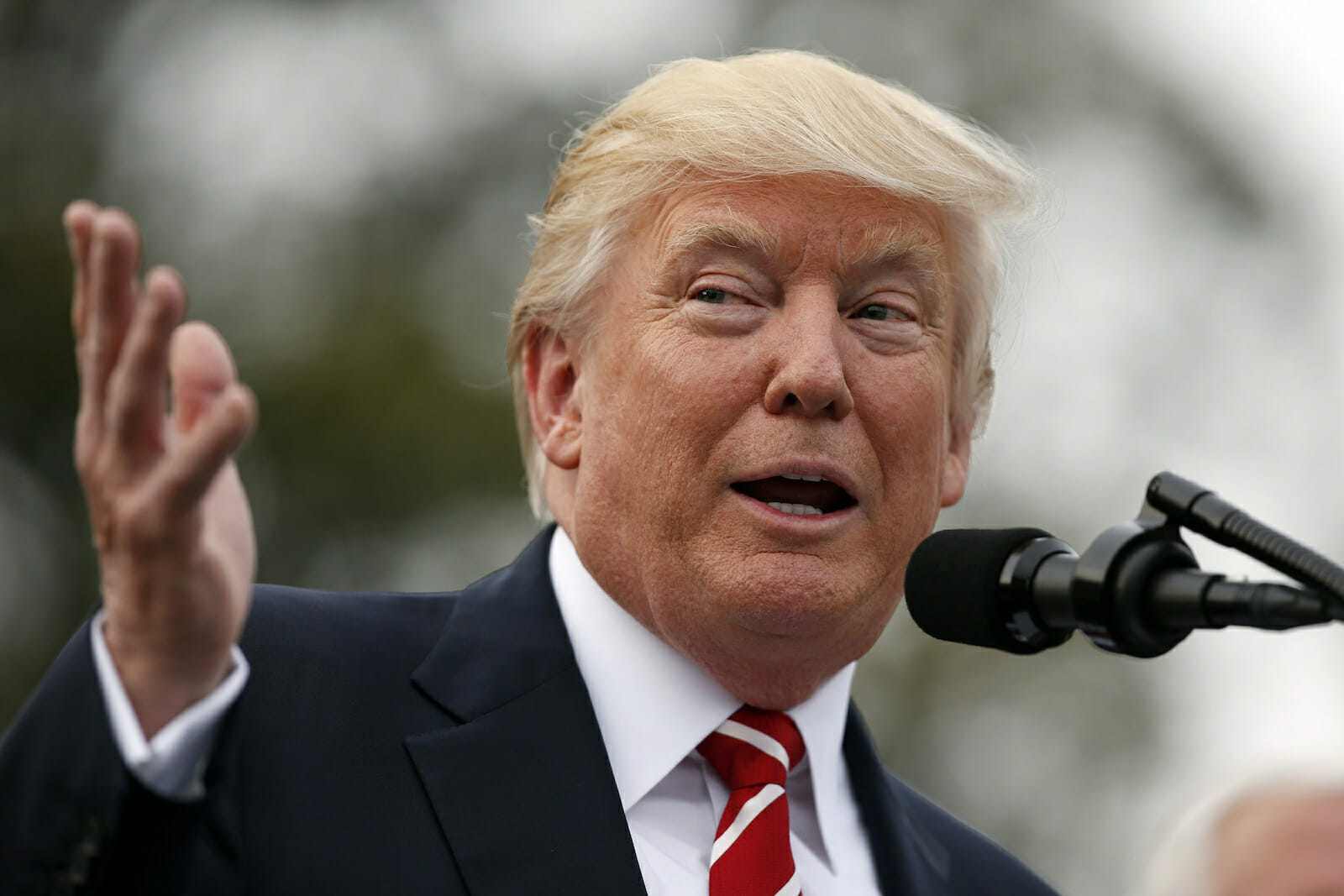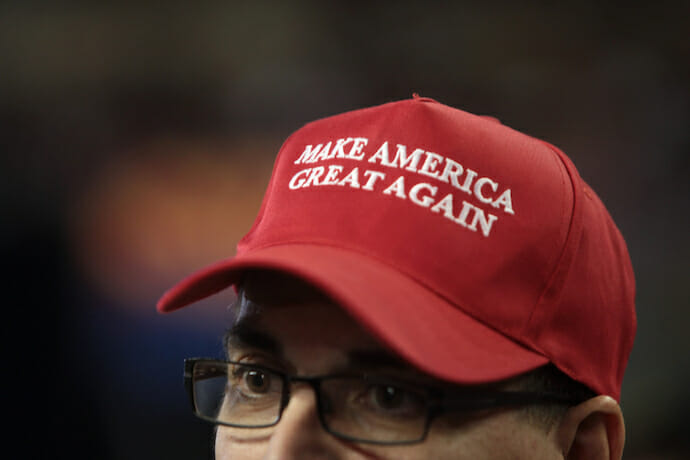
Donald Trump and America’s Future
The success of Donald Trump is due largely to the wave of protests that played a crucial role during the last presidential campaign season. His supporters are a very diverse group; and their reasons for supporting him are very different. However, despite their differences, they all share an extreme loathing for the American political establishment, both Democratic and Republican. In their view (and this view is shared by many Americans who do not support Trump), our political system is completely broken. Our politicians, both the Democrats and the Republicans, are corrupt and self-serving; and they place their own interests above those of the American people and the country.
The outrage against the establishment displayed by millions of Americans clearly shows that the elites have lost control over the political system. The loathing of the establishment that has become so widespread among common Americans is the main reason why a political outsider who promises “to drain the swamp” and “give America back to the American people” has been able to prevail against incredible odds and defeat a powerful candidate with the support from both sides of the aisle.
The popular upheaval that resulted in the election of Donald Trump was spontaneous and largely disorganized. Its principal strength was its emotional appeal. For those who took part in it, the primary motivation was their anger against the elites. They had no rational political agenda and no clearly articulated goals.
Donald Trump has much in common with his supporters. Although Trump is a man of means and has connections, he is not a member of what we consider the political class. He is a businessman who has the image of a self-made man. His criticism of the political class resonates with the feelings and attitudes of those who backed him in the last election. His carefully cultivated image of a man of the people may be a simulacrum, but it is one in which many of his supporters strongly believe. Trump is a master of sarcastic tweets and short quips, not carefully crafted speeches. He is better known for his terse catchy slogans (“Let’s Make America Great Again,” “Drain the Swamp,” “Give America Back to the American People,” and others) than for making lengthy and intellectually compelling arguments.
As a businessman, Donald Trump has brought into his campaign and later presidency the experience and skills that he has acquired in the business world. Like many others business people, Trump has an acute sense of opportunity. He is driven by opportunities, both in business and politics, not by pursuit of life-long agendas. In a very fundamental sense Trump is an opportunist and a pragmatist. He has also brought to his new job another important skill that he untiringly advertises as “the art of making a deal.”
Trump’s qualities and skills are undoubtedly valuable for someone in his position. Many American presidents in the past possessed them in varying degrees and used them to their advantage. They will certainly help him too. However, these qualities serve well when one operates in a relatively stable environment that does not require fundamental changes; that is, they are good in society that is in the state of equilibrium. What characterizes the current state of our society is precisely disequilibrium. The state of our civilization today is anything but stable. Our entire social system is in a transition from one state to another. What we see in our society today is the emergence of an organization of society that is very different from the one it has had to this moment. This new organization also requires a fundamental change in our social practice.
During the last few decades our civilization has experienced some very momentous developments. The most dramatic one is arguably the rapid proliferation of new technologies. Computers, robots, automata have literally flooded our life. Innovations in communication technologies help to bring people from different parts of the world closer together and accelerate the exchange of ideas and knowledge beyond anything hitherto imaginable. The process of globalization is another important development that characterizes the current period. It has brought capitalist progress and the creation of new wealth to many hitherto underdeveloped parts of the world. All these developments have exerted and continue to exert powerful influence on our life. Machines, for example, increasingly replace human labor in performing repetitive and monotonous physical or mental operations, thus freeing humans for creative work. Our economy is increasingly focused on the production of such intangibles such as knowledge, ideas, information, rather than tangible goods. Entrepreneurship and creativity are in much greater demand today than at any time in the past.
These developments indicate that a profound transformation of our entire social system—a transition to new forms of organization and social practice—is under way. Such systemic transitions are complex multi-dimensional phenomena. Their success vitally depends on coordinated policies. They cannot be driven by chance and circumstances. They cannot depend on decisions that pursue subjective and fortuitous advantages. An opportunistic approach is not particularly useful in systemic transformations. Under the laws of probability, uncoordinated transitions have at most a 50/50 chance of success. Without coordination, some policies may advance systemic transition while others may impede it.

Policies driven by opportunities are inevitably chaotic, inconsistent, and contradictory. We can already see such inconsistencies and contradictions in Donald Trump’s policies. For example, the most important problem that Donald Trump has chosen to tackle is the problem of growth. His approach to growth is to reduce government interventions into the economy, to enhance the market forces and let them do the job. His tax cuts are designed to achieve this goal. However, his other policy reinstates government interventions into the economy in the form of protectionist tariffs. Another example of inconsistency is his immigration policy. Trump introduced the zero tolerance strategy toward illegal immigration only to beat a retreat when political pressures began to mount. This is not to advocate one policy over another. This is simply to point out the fact of inconsistencies, rather than coordinated policies that pursue a specific and clearly articulated goal. Inconsistencies and contradictions are not good in transition periods. They make transitions less efficient and more painful.
What will be the likely results if Trump’s continues to pursue his muddled and inconsistent perspective?
The tax cuts that went into effect at the beginning of 2018 have obviously invigorated the economy. The GDP is up, the unemployment figures are down, and the incomes, at least for some groups of the population, are on the rise. There is every reason to believe that in the current conditions with more money available the economy will grow. Its growth, given the current trends, will be primarily in hi-tech areas. The branches of the economy that produce or use high technology will be expanding and their productivity will be rising. The likely result of this development will be a growing gap between the rich and the poor, as money will follow productivity. Those employed in hi-tech areas will continue to command hefty incomes and enjoy a robust standard of living.
Although this news is certainly welcome, it will have a serious downside. Technology saves labor. As a result of new advances in technology, more hi-tech devices will replace human labor, which means that more job categories will continue to disappear and those who are currently employed in these areas will have to join the ranks of the unemployed or even unemployable at least for some time until they retrain into the jobs required by the economy; at least some of the displaced may have to accept jobs with much lower earnings than those they have had prior to displacement.
The most immediate effect of such development will be a reduction in consumption as individuals whose income has declined will likely cut their spending and accept a lower standard of living Reduction in consumption means unsold inventories and a decline in production. A sagging pace of growth will most certainly undermine the political credibility of Donald Trump and his economic agenda.
However, this unwelcome development will not be the worst news. Until now technological progress affected mostly menial jobs that do not necessarily bring high earnings or prestige. The new cycle of innovation may pose a threat to high-paying, well-respected, and eagerly sought (at least now) jobs. Given the pace of the technological innovation, new advances may affect employment in such lines of professional employment as lawyers and doctors. These jobs require a great deal of education, sacrifice, commitment, and training; they command high respect in our society, and are very well remunerated. These jobs are viewed in our society as quintessentially good middle class jobs. The effect of their disappearance or a significant reduction will be very painful and demoralizing.
The continued erosion of the middle class and the growing gap between the rich and the poor may seriously distort the development of our economy and make our society less stable, even if the overall economic performance is acceptable. As the smaller segment of the population will enjoy a bigger share of the total wealth, the economy is likely to cater more to this segment of our society. Our society may see more of a visible display of conspicuous consumption such as lavish real estate, extravagant yachts, luxury automobiles, and exotic travel tours (perhaps even into outer space that may cost millions of dollars), while at the same time the production of decent quality goods for lower income earners will constitute a much lower share of the overall market. This development will seriously distort our economy that in the past has shown spectacular growth precisely due to mass produced goods for the common people.
There is an intense awareness of the growing danger of income disparity in our society and no shortage of proposals to solve this problem. Such solutions include, for example, the introduction of a universal basic income for all citizens; use of government programs; increased employment in various non-productive areas; full employment guaranteed by the government, and others. Despite their differences, all these proposals emphasize the need for some form of redistribution of wealth.
While redistribution of wealth may have some temporary salutary effect on the economy, it ultimately does not solve the problem of growth. The key to the solution of the problem of growth is efficient economy. We consider economy efficient if it uses efficiently resources available to it. Our most important economic resource is people and their capacity to create. The evolution of our economy from prehistoric times to the present shows that economic growth has been due to human creations: new modes of production, new products, new industries, new natural resources, and similar novelties. Creative innovation is the key to our economic growth, and creativity is the exclusive preserve of humans. No machine, no computer, and no robot can match humans in their capacity to create. Therefore, by fully utilizing the capacity to create possessed by all human beings we can solve the problem of growth. The future of our economy and our society rests on such full utilization. This resource has an infinite potential. It is the only resource that does not depreciate. On the contrary, it appreciates when used.
The full utilization of human capacity to create will require a fundamental reorganization of our social practice. Currently our social practice is dominated by hierarchical interactions. Their distinct role in human systems is to conserve and optimize what has emerged in non-hierarchical interactions among equals. Such interactions in networks combine differences to create new and more powerful levels of organization of reality. Indeed, the role of hierarchies is important but it is also important that they should not interfere and prevent non-hierarchical interactions from performing their creative role. The new social practice must ensure that hierarchical and non-hierarchical interactions are in balance, as they are in many systems that exist in nature; and that hierarchies and elites do not dominate over society.
Donald Trump is not talking about a long-term solution of the problem of growth; he has not even clearly formulated the main problem to be solved. He sticks with the tired truths and catchy slogans. But then why do we expect Donald Trump to solve problems that we all as a society face? Why do we expect anyone, including our presidents, to solve our problems?
From its very foundation America has been and is about freedom and democracy. The fact is etched in our Constitution and in the Bill of Rights. Unlike other political systems, democracy is not about leaders and elites. In a very true sense, democracy is about universal inclusion and empowerment. It is about us solving our problems, rather than relying on the select few to solve them for us.
The Chinese symbol for “crisis” also means “opportunity.” Indeed, in crisis situations when the screws that hold the existing order together are loose, the abandoning of long-held dogmas, old self-evident truths, and revered pieties becomes possible. The current period of transition offers such opportunities. The most important opportunity it offers is the opportunity to act, to realize our creative potential, and to fulfill this wonderful dream we call America that all of us who have come to this country embrace.
